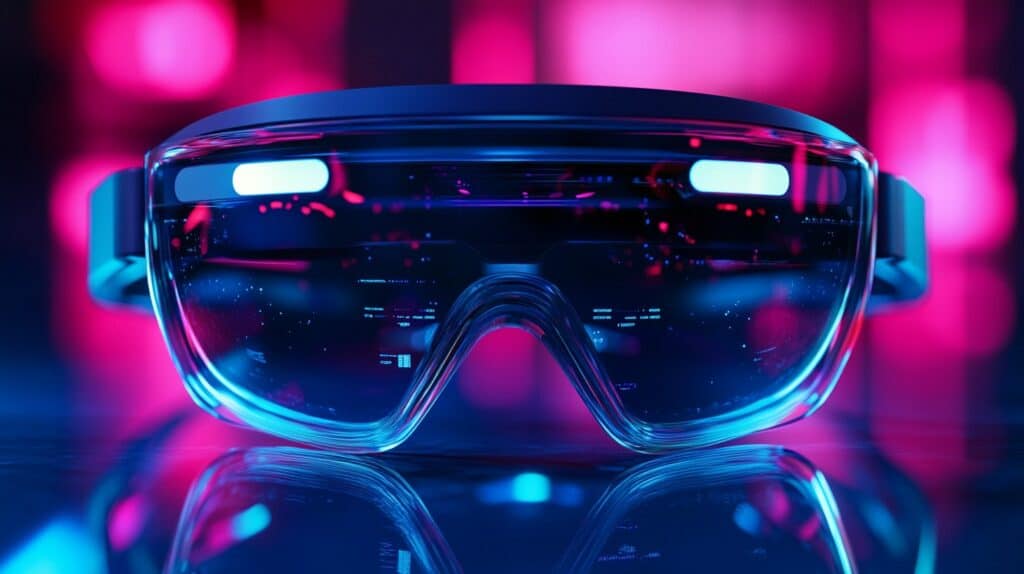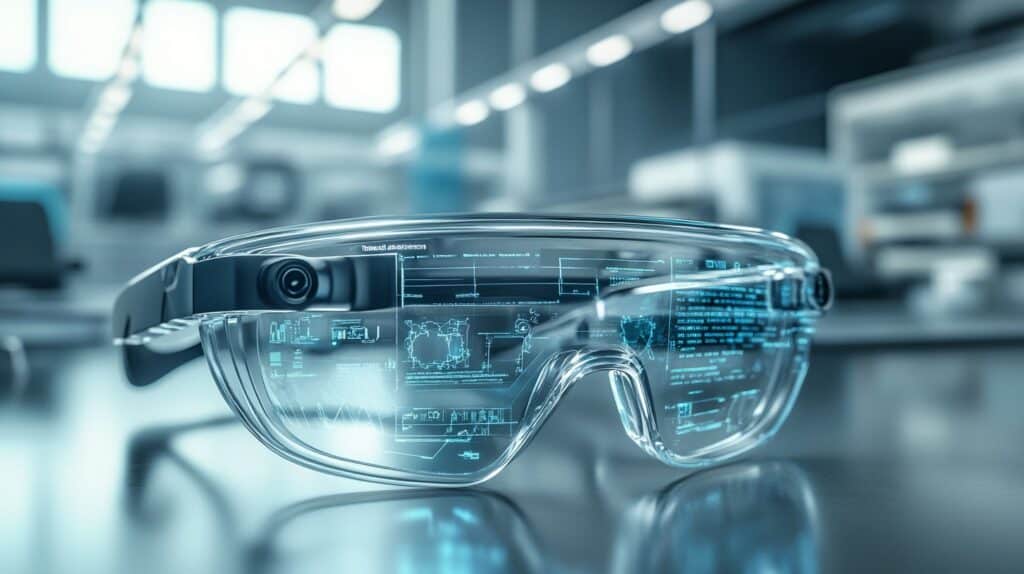Ever felt like your smartphone just isn’t enough anymore? Say hello to augmented reality glasses – they’re changing how we see… well, everything. 2 These high-tech specs add digital info right onto what you’re looking at.
Pretty cool, huh? They’re not just for tech enthusiasts, either. From factories to your home, AR glasses are making waves. 1 Ready for some amazing facts? 3
Key Takeaways
AR glasses overlay digital info onto the real world, enhancing your view with computer-generated images and data.
Major tech companies like Google, Apple, Microsoft, and Facebook are investing heavily in AR glasses technology, with Apple’s Vision Pro headset launching in 2023 for $3,499.
AR glasses are being used across industries, from improving efficiency on factory floors to transforming business operations and enhancing everyday consumer experiences.
The AR gaming market is expected to reach $284.9 billion by 2023, showing the growing popularity of AR technology.
Future AR glasses may use holographic imaging and nanophotonic technology to display 3D moving images, but challenges like battery life, display quality, and privacy concerns still need to be addressed.
Table of Contents
Exploring Augmented Reality Glasses

Ever wondered what it’s like to see the world through tech-enhanced eyes? AR glasses are here to blow your mind. They’re not your average specs – these bad boys overlay digital info right onto your real-world view.
Definition and Core Features
AR glasses are like magic windows to a digital wonderland. These high-tech specs overlay computer-generated images onto your real-world view, blending the digital and physical worlds seamlessly.
Think Iron Man’s heads-up display, but in a pair of stylish shades. The main features? A camera to capture your surroundings, a mini-computer to process data, and a see-through display to show you the goods. 1
But here’s the thing – AR glasses don’t trap you in a virtual bubble. They boost your reality, not replace it. You’re still firmly planted in the real world, just with some digital icing on top.
It’s like having a personal assistant, navigation system, and encyclopedia all rolled into one sleek package perched on your nose. Pretty cool, right? 2
AR glasses are the Swiss Army knife of wearable tech – they’ve got a tool for every situation.
Comparing AR Glasses and VR Glasses
AR and VR glasses are changing how we see the world… but they’re not the same beast. Let’s break it down:
| AR Glasses | VR Glasses |
|---|---|
| Overlay digital content on real world | Total immersion in virtual environment |
| Enhance existing surroundings | Replace real world with digital one |
| Simpler, lighter design | More complex headsets |
| Less processing power needed | Requires more powerful hardware |
| Can be used while moving around | Often requires stationary use |
I’ve tried both, and let me tell you – it’s night and day. AR feels like adding a layer of magic to your world. VR? It’s like stepping into a whole new universe.
The integration of AR in casinos can also offer valuable insights, similar to how relegation odds Premier League provides critical information for sports enthusiasts. It’s a game-changer for both industries.
Mixed Reality (MR) is where things get really wild. It’s the lovechild of AR and VR, blending the best of both worlds. 3 Next up, let’s dive into the tech that makes these glasses tick.
Technologies Powering AR Glasses

AR glasses pack some serious tech under the hood. Let’s peek at the gizmos that make these futuristic specs tick.
Display Technology
Display tech is the heart of AR glasses. It’s what lets you see digital stuff overlaid on the real world. The goal? Crystal clear images that blend seamlessly with your surroundings.
Recent breakthroughs have brought us closer to this dream. Holographic Optical Elements (HOEs) and micro-LED displays are game-changers. They offer bright, fast-responding visuals that pop even in sunlight. 5
But there’s more to it than just pretty pictures. AR displays need to be sharp… really sharp. We’re talking 60 pixels per degree sharp. That’s the sweet spot for fooling your eyes into thinking digital objects are real.
And brightness? It’s crucial. A 10:1 Ambient Contrast Ratio keeps things readable even when you’re outside on a sunny day. Some clever folks are even working on “foveated displays” that focus the sharpest image right where your eyes are looking.
Pretty nifty, huh? 6
The future of AR is so bright, you gotta wear shades… or better yet, AR glasses.
Camera Systems
Moving from display tech to camera systems in AR glasses is like shifting gears in a sports car – smooth but powerful. These bad boys pack some serious visual punch. Front-facing cameras are the eyes of AR glasses, scanning the world around you.
They’re not just for snapping selfies… these cameras are constantly on the lookout, recognizing landmarks and anchors in your environment. 6
But here’s where it gets really cool. The cameras team up with smart software to create a virtual map of your surroundings. It’s like having a personal cartographer in your specs! This tech combo allows AR glasses to overlay digital info onto the real world seamlessly.
Throw in some fancy sensors like lidar, and you’ve got a device that can analyze your environment faster than you can say “augmented reality. 7
Computer Perception and Registration
Computer perception in AR glasses is like giving them a brain. These smart specs use cameras and sensors to “see” the world around you. They can recognize objects, people, and spaces in real-time.
It’s pretty wild – imagine your glasses knowing you’re looking at a coffee mug and instantly displaying its caffeine content. Or recognizing your friend across the street and showing their latest social media post.
That’s the power of computer perception. 6
Registration is where the magic happens. It’s how AR glasses align digital content with the real world. Using tech like simultaneous localization and mapping (SLAM), these glasses create a virtual map of your surroundings.
They then use this map to place digital objects in the right spots. So when you’re playing Pokémon GO, that Pikachu actually looks like it’s sitting on your kitchen table. It’s not perfect yet – sometimes things can look a bit off.
But hey, we’re getting there! And with new advances in metasurfaces and pancake optics, AR glasses are getting smaller and more accurate every day. 8
Leading Companies in the AR Glasses Industry

The AR glasses industry is heating up, with tech giants battling for supremacy. These companies are pouring billions into R&D, racing to create the next big thing in wearable tech.
Google’s been at the AR glasses game for a while now. They kicked things off with Google Glass back in 2012 – a cool $1,500 gadget that turned heads… and raised some eyebrows. 9 Fast forward to 2020, and they’ve rolled out the Google Glass Enterprise Edition 2.
It’s a bit easier on the wallet at $999, but still packs a punch. These specs aren’t just for show – they’re changing how we work and play.
But Google’s not resting on its laurels. They snagged North, another AR company, to beef up their tech. It’s like they’re playing chess while everyone else is figuring out checkers.
From factory floors to your living room, Google’s pushing the boundaries of what’s possible with AR. 10 So, what’s next on the horizon for AR glasses? Let’s take a peek at Apple’s moves in this space….
Apple
Apple’s making waves in the AR glasses game, folks. 11 They’re cooking up something called Apple Glass – pretty slick, right? Word on the street is these bad boys will sync with your iPhone…
no muss, no fuss. But here’s the kicker: they might just kick your prescription lenses to the curb. And get this – they’re talking about a $499 price tag. Not too shabby!
But hold onto your hats, ’cause Apple’s not stopping there. On June 5, 2023, they dropped a bombshell: the Apple Vision Pro. 12 This mixed reality headset’s a whole different ballgame.
At $3,499, it’s not cheap, but it’s packed with cool tricks. You can control it with your eyes, hands, or voice. Plus, most of your iPhone and iPad apps? They’ll work just fine on this bad boy.
What’s next for AR glasses? Let’s dive into the other players in the field.
The future is already here – it’s just not evenly distributed. – William Gibson
Microsoft
Microsoft’s making waves in the AR glasses game. They’re not just playing catch-up with Google – they’re bringing their A-game to the enterprise market with HoloLens. This bad boy hit the scene in 2016 as the first untethered mixed reality device.
Talk about a game-changer! But Microsoft didn’t stop there. They’ve cooked up some sweet AR tools for businesses, like Dynamics 365 Guides. It’s all about holographic solutions for training and skill development – pretty nifty, right? 13
But here’s where it gets really cool. Microsoft’s Dynamics 365 isn’t just another piece of software. It’s a powerhouse for employee collaboration and learning. Imagine your team using AR to optimize business operations…
that’s next-level stuff! And it’s not just for tech geeks. These tools are designed to make life easier for everyone on the factory floor. Now, let’s take a peek at what Apple’s brewing in their AR lab…9
Facebook’s entering the AR glasses market – and they mean business. In fall 2021, they partnered with Ray-Ban to release their first smart specs. But that’s just the start. The main event? Their Nazare AR glasses, coming in 2024.
These glasses aren’t just stylish – they’re packed with advanced technology. 14
And there’s more! Facebook (now Meta) is diversifying. They’re developing a more affordable option called Hypernova, also planned for 2024. Here’s the kicker – they’re creating an EMG wristband that’ll let you control these glasses with your thoughts.
Yes, you heard that correctly. With 18,000 employees now working on this metaverse hardware, it’s clear Meta’s making a big investment in AR. 15
Other Influential Players
AR glasses are shaking up the tech world, and it’s not just the big names making waves. Let’s dive into some other key players who are pushing the boundaries of what’s possible with these futuristic specs.
- Vuzix: This company’s making a splash with their Blade AR Smart Glasses. Priced at $799.99, they’re not cheap, but they’re packed with features that’ll make your jaw drop.
- Epson: They’re not just about printers anymore. Epson’s Moverio AR glasses are turning heads in the business world, offering slick solutions for commercial use.
- TCL: Budget-friendly doesn’t mean basic. TCL’s NXTWEAR S RayNeo XR glasses boast a whopping 130-inch virtual display. That’s like having a massive TV right in front of your eyes! 16
- Xreal: Talk about bang for your buck. Their Air AR Glasses, priced at just $299 on Amazon, can project up to a 201-inch screen in AR mode. It’s like carrying an IMAX in your pocket. 9
- Rokid: These folks are all about smooth performance. Their Max AR glasses feature a 215-inch virtual screen with a 120 Hz refresh rate. That’s buttery-smooth visuals that’ll make your eyes dance with joy.
- North (acquired by Google): While they’re now under Google’s wing, North’s stylish Focals smart glasses showed that AR doesn’t have to look geeky. They proved AR can be fashion-forward too.
- Nreal: Another player in the affordable AR space, Nreal’s glasses are making waves with their compact design and powerful features. They’re showing that good things can come in small packages.
Uses of AR Glasses Across Industries

AR glasses are shaking things up in all sorts of industries. From factory floors to office spaces, these high-tech specs are changing how we work and play.
Industrial Applications on Factory Floors
AR glasses are changing factory floors. These advanced specs offer real-time assembly instructions, making tricky tasks easier. Workers can see step-by-step guides projected right in front of them, improving efficiency and cutting down on mistakes.
It’s like having a personal coach… but it’s all visual. These cool gadgets also help catch machinery issues early. Think about spotting a problem before it stops production – that’s what AR can do on the factory floor. 17
And there’s more! Companies like Nsflow are pushing AR further with digital workflow solutions. A new worker gets stuck? No need to stop everything – they can call in a remote expert who sees what they see.
It’s like super-charged FaceTime for industrial support. AR glasses are also making training way more fun. New employees can practice assembly in a safe virtual space before working on the real thing.
It’s hands-on learning without any “oops, I broke it” moments. 18
Digital Transformation in Business Operations
AR glasses are changing how businesses operate. They’re not just fancy gadgets – they’re game-changers. A worker on the factory floor gets real-time instructions right in their field of view.
No more flipping through manuals or squinting at tiny screens. These high-tech specs are improving processes and boosting efficiency like never before. 17
But it’s not just about factory work. AR glasses are changing offices too. Virtual desktops float in mid-air, or holographic images of 3D models you can manipulate with your hands.
It’s like something out of a sci-fi movie… except it’s happening now. Companies are using these wearable devices to change everything from design to customer service. The future of business is here – and it’s looking pretty cool through AR lenses. 19
Daily Consumer Applications
AR glasses are changing how we do everyday stuff. You can check phone notifications without taking it out, or get cooking instructions floating in front of you. Cool, right? These high-tech specs overlay digital info on the real world, making life easier and more fun.
Shopping’s simple – you can see how furniture looks in your room before buying. And gaming? It’s amazing. Remember Pokémon Go? That’s just the start. With 32% of consumers already using AR for shopping in 2020, there’s a lot to do in AR and VR. 20
I tried on a pair of these glasses last week. Wow, it was incredible! I could see my buddy’s texts pop up right in my field of view. No more fumbling for my phone. And walking down the street, little arrows showed me exactly where to turn for the nearest coffee shop.
It felt like I had superpowers. With the AR gaming market expected to reach $284.9 billion by 2023, we’re in for some awesome experiences. Now, let’s look at the future of AR glasses and what’s coming next. 17
The Future Landscape of AR Glasses

AR glasses are about to get wild. Think holograms floating in your living room… or a virtual assistant that follows you around. Wanna know what’s coming next? Keep reading!
Emerging Innovations
Holographic imaging is taking AR glasses to new heights. Stanford researchers have cooked up a prototype that’s turning heads. These specs can display 3D moving images – talk about eye candy! 21 But that’s not all…
They’re designed to be compact, so you won’t look like you’ve got a computer strapped to your face. The secret sauce? Nanophotonic tech called metasurface optics. It’s like shrinking down a whole optical system into a thin, flat surface.
Pretty nifty, right?
These cutting-edge glasses aren’t just for show. They’re packing some serious potential for gaming, entertainment, training, and education. Imagine playing your favorite video game…
but in real life. Or learning about ancient history by walking through a virtual Roman colosseum. The possibilities are endless. And with AI in the mix, these glasses could get smarter over time.
They might even start anticipating what you want to see before you do. It’s like having a personal assistant… for your eyeballs! 3
Challenges and Proposed Solutions
AR glasses face some tough hurdles. Battery life is a big one – nobody wants their cool specs dying mid-use. Display quality needs a boost too. Imagine trying to read text that’s all blurry…
not fun. And let’s talk hand tracking. It’s gotta be spot-on for a smooth experience. But hey, tech wizards are on it! 22
Privacy’s another biggie. These glasses can see and hear a lot. So, keeping that data safe is crucial. Plus, we need to make sure wearing AR specs doesn’t turn us into zombies walking into traffic.
Companies are working on better location systems and safety features. It’s a balancing act – amazing tech that doesn’t compromise our wellbeing or privacy. 23
People Also Ask
What are augmented reality glasses?
Augmented reality glasses are wearable gadgets that blend digital info with the real world. They’re like smartwatches for your eyes! These high-tech specs use transparent displays to show virtual objects in your field of view. It’s like having a smartphone screen floating in front of you.
How do AR glasses differ from virtual reality headsets?
AR glasses don’t shut you off from reality like VR headsets do. They add digital elements to what you see. VR creates a whole new world, while AR enhances the one you’re in. Think Pokémon GO, but right in front of your eyeballs!
What cool features do AR glasses have?
These futuristic specs pack a punch! They often include voice control, touchpads, and motion controllers. Some even have haptic feedback. Imagine checking your emails or playing games without lifting a finger. It’s like being a tech-savvy wizard!
Can AR glasses replace my regular eyewear?
Some AR glasses can include vision-correction lenses. It’s a two-for-one deal! You get clear vision and digital superpowers. However, not all models offer this feature yet. The tech is still evolving, so keep your eyes peeled for updates!
What industries use AR glasses?
AR glasses are making waves in many fields. They’re used in maintenance, design, and customer service. Doctors use them during surgeries, and engineers use them for 3D modeling. It’s like having a digital assistant right before your eyes!
Are there any challenges with AR glasses?
Like any new tech, AR glasses face some hurdles. Issues like battery life, weight, and field of view need work. There’s also the challenge of making them look stylish. After all, no one wants to look like a cyborg at the coffee shop!
References
^ https://www.ncbi.nlm.nih.gov/pmc/articles/PMC8703032/
^ https://en.wikipedia.org/wiki/Augmented_reality
^ https://www.ncbi.nlm.nih.gov/pmc/articles/PMC8324499/
^ https://sopa.tulane.edu/blog/whats-difference-between-ar-and-vr
^ https://www.ncbi.nlm.nih.gov/pmc/articles/PMC8546092/
^ https://pluto-men.com/how-ar-glasses-work/ (2022-11-29)
^ https://www.ncbi.nlm.nih.gov/pmc/articles/PMC10381749/
^ https://www.nature.com/articles/s41377-021-00658-8
^ https://www.popularmechanics.com/technology/gadgets/a44067373/best-ar-smart-glasses/ (2023-06-20)
^ https://www.pcmag.com/picks/the-best-smart-glasses
^ https://www.voguebusiness.com/technology/apples-ar-glasses-are-here-fashion-is-watching
^ https://www.apple.com/apple-vision-pro/
^ https://dynamics.microsoft.com/en-us/mixed-reality/guides/what-is-augmented-reality-ar/
^ https://www.theverge.com/23022611/meta-facebook-nazare-ar-glasses-roadmap-2024 (2022-04-13)
^ https://tech.facebook.com/reality-labs/2020/9/facebook-connect-the-road-to-ar-glasses/
^ https://www.statista.com/topics/10134/ar-glasses/
^ https://nsflow.com/blog/ar-glasses-use-cases (2023-09-20)
^ https://www.lightguidesys.com/resource-center/blog/6-uses-of-augmented-reality-for-manufacturing-in-every-industry/ (2022-02-23)
^ https://technologymagazine.com/top10/top-10-uses-for-ar-in-the-workplace (2024-07-17)
^ https://citrusbits.com/stats-and-facts-about-augmented-reality/
^ https://www.linkedin.com/pulse/future-augmented-reality-glasses-exploring-qv5bc
^ https://www.cnet.com/tech/computing/the-future-of-ar-beyond-vision-pro-is-already-brewing/
^ https://swisscognitive.ch/2021/07/27/6-ar-vr-challenges-in-2021/ (2021-07-27)




